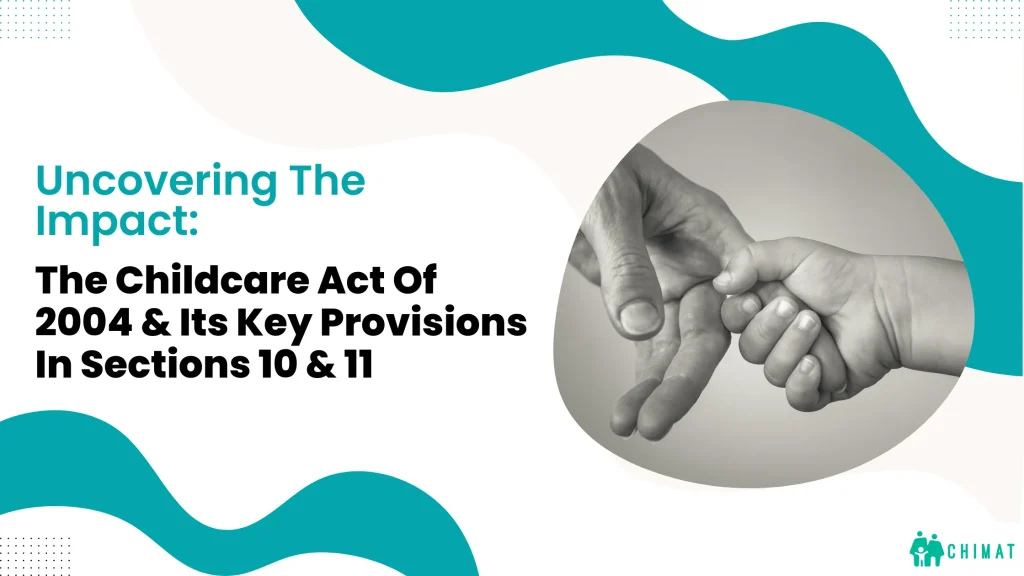
The Childcare Act of 2004 is a pivotal piece of legislation in the United Kingdom that aims to ensure the welfare and protection of children receiving childcare services. This article will provide a comprehensive overview of the Act, focusing on Sections 10 and 11.
These sections hold significant importance, as they cover key aspects related to local authority duties, information provision, and regulators’ role in promoting high-quality childcare.
To gain a deeper understanding, we will explore the contents of the Act, highlight its implications, and shed light on its impact on the childcare sector.
Overview of the Childcare Act:
The Childcare Act of 2004 was enacted to enhance the standards of childcare provision, strengthening the regulatory framework and safeguarding the well-being of children.
It establishes guidelines for local authorities, childcare providers, and regulators to ensure the delivery of safe, effective, and high-quality childcare services across the UK. The Act encompasses several sections addressing various aspects of childcare, such as registration, inspection, and local authority responsibilities.
Section 10: Local Authority Duties:
Section 10 of the Childcare Act places important duties on local authorities regarding providing childcare services. It requires them to improve the accessibility, availability, and quality of childcare in their respective areas.
Local authorities are expected to develop strategies, consult stakeholders, and create plans to ensure sufficient childcare provision to meet the needs of working parents, children with disabilities, and children needing protection.
Furthermore, Section 10 emphasizes the significance of collaborative partnerships between local authorities and relevant organizations to enhance the coordination and effectiveness of childcare provision.
It empowers local authorities to offer childcare providers financial assistance, grants, and training opportunities, thereby promoting the continuous improvement of childcare services within their jurisdiction.
Section 11: Provision of Information:
Section 11 of the Childcare Act focuses on providing information to parents, guardians, and the wider public regarding available childcare services.
It mandates local authorities to establish and maintain an information service that offers comprehensive details about registered childcare providers, including their services, facilities, and quality ratings. This provision enables parents to make informed choices about suitable childcare options for their children, ensuring their well-being and development.
Additionally, Section 11 recognizes the significance of ensuring that parents have access to accurate and up-to-date information regarding financial support available for childcare costs.
Local authorities are tasked with informing parents about financial assistance schemes, tax credits, and other subsidies, thus promoting affordability and accessibility of childcare services for all families.
Implications and Impact of Sections 10 and 11:
Sections 10 and 11 of the Childcare Act have profoundly impacted the childcare sector in the United Kingdom.
By placing duties on local authorities, the Act has compelled them to prioritize childcare provision and develop robust strategies to meet the diverse needs of families. This has led to an increase in the availability of childcare places, particularly for children with disabilities and those in vulnerable circumstances.
Furthermore, the provision of comprehensive information through Section 11 has empowered parents to make informed decisions regarding childcare.
With access to detailed information about registered providers and available financial support, parents can choose high-quality and affordable childcare options that best meet their requirements. This transparency has fostered accountability among childcare providers and driven them to maintain high standards of care.
The implementation of Sections 10 and 11 has also resulted in enhanced collaboration between local authorities, childcare providers, and regulatory bodies.
By establishing effective partnerships, stakeholders have been able to share best practices, coordinate resources, and collectively improve the quality of childcare services across the country.
In conclusion, the Childcare Act of 2004, with its key provisions in Sections 10 and 11, has significantly influenced the childcare sector in the United Kingdom.
By emphasizing local authority duties and providing comprehensive information, the Act has paved the way for improved accessibility, enhanced quality, and informed decision-making.
It continues to be a cornerstone in safeguarding the well-being and development of children, shaping the future of childcare in the UK.
